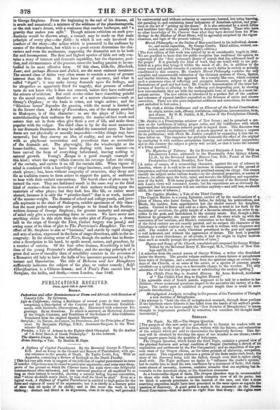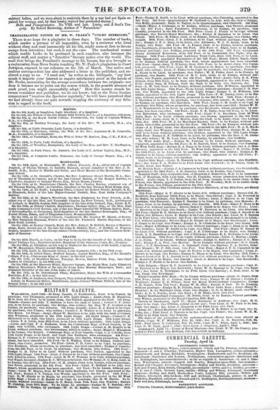PUBLICATIONS RECEIVED.
Front Apri11014 to April 16th.
BOOKS.
Pedestrian and other Reminiscences at Hems and Abroad; with Sketches of Country Life. By Sylvanus. Isle in Calsfornia• during a Residenceof several years in that territory: comprising a Description of the Country and the Missionary Establish- ments, with Incidents, Observations, &c. Illustrated with numerous En- gravings. By an American. To which is annexed, an Historical Account of the Origin, Customs, and Traditions of the Indians of Alta-California Translated from the original Spanish Manuscript.
Scrofula ; its Nature, its Causes. its Prevalence, and the Principles of Treat- ment. By Benjamin Phillips, F.R.S., Assistant-Surgeon to the West- minster Hospital.
Pericles; a Tale of Athena in the Eighty-third Olympiad. By the Author of " A Brief Sketch of Greek Philosophy." In two volumes.
The Queen's Lieges. In four volumes.
Helen Stanley; a Tale. By Matilda M. Hays.
A Defence of Capital Punishment. By the Reverend George B. Cheerer, D.D. And an Essay on the Ground and Reason of Punishment, with spe- cial reference to the penalty of Death. By Tayler Lewis, Esq. With an Appendix, containing a Review of Burleigh on the Death Penalty.
[This isa very able work in support of the infliction of capital punishment in cases of murder. Objections may be raised to particular arguments ; and some may disap- prove of the ground on which Dr. Cheever bases his main view—the Scriptural commandment often reiterated, and the universal practice of all mankind for so long as their history is recorded, showing a natural feeling beyond convention, that " whose sheddeth man's blood, by man shall his blood be shed." Even as a logical work, A Defence of Capital Punishment is entitled to high praise for the force and cogency of many of its arguments; but it is chiefly in a literary point of view that we spoke of its ability; and in this sense the work is very striking: distinct and direct in its arguments, close in its style, well pervaded by controversial acid without acrimony. or coarseness; learned, but using learning, not parading it; and containing many indications of American opinion, and prac- tices in the art of "getting up the steam." It is also animated by a much loftier and healthier tone than is usually found in American writers. Those who have no other knowledge of Dr. Cheever than what they have derived from his Wan- derings in the Shadow of Mont Blanc, will be agreeably surprised by the vigour closeness, and logic of the present volume.]
Moral Philosophy; or the Duties of Man considered in his individual, domes- tic, and social capacities. By George Combe. Third edition, revised, cor- meted, and enlarged. (The People's edition.)
[The first edition of this work was noticed by us at considerable length in 1841. We are gratified to learn that the public reception has confirmed the o 'on we expressed of the " first systematic theory of morals that has addressed itself to the people." It is precisely the kind of work that one would wish to see pub- lished at a price that brings it within the reach of all : for, in addition to the many sound and useful remarks it contains on men's duties in society as actually constituted in this country, Mr. Combe's Moral Philosophy contains the only complete and unanswerable refutation of the visionary systems of Owen, Spence, and similar thinkers, that has appeared. In a country like ours, which contain; such a numerous class of reflecting and energetic labourers, subject to all the fluctuations of good and bad trade, Mr. Combe's demonstration of the utter hol- lowness of fancies so alluring to the suffering and desponding poor, by showing how irreconcileable they are with the unchangeable laws of nature, is a most im- portant service. The new edition is introduced by a preface full of the candour and tolerance of ripened intellect engrafted on the firmness of entire and sincere conviction. There are also some important additions and corrections, for the most part embodied in foot-notes.]
The Oath a Divine Ordinance and an Element of the Social Constitution: its origin, nature, ends, efficacy, lawfulness, obligations, interpretation, form, and abuses. By D. K. Junket, A.M., Pastor of the Presbyterian Church, Greenwich, N. J.
[Mr. Junkin is a Presbyterian minister of New Jersey; and he preached a ser- mon on the lawfulness of taking proper oaths, and the indifference with which their needless multiplication induced people to regard them. This discourse was received by several congregations with so much approval as to induce a request for its publication; with which Mr. Junkin complied by expanding it into the vo- lume before us. This expansion has probably weakened the effect of the original by overlaying it with needless antiquarian learning and subordinate arguments; and in this country the subject is pretty well settled, so that it lacks the interest of a living question.] The Mysteries of Tobacco. By the Reverend Benjamin J. Lane. With as Introductory Letter, addressed to the Honourable John Quincy Adams, LL.D., by the Reverend Samuel Hanson Cox, D.D., Pastor of the First Presbyterian Church, Brooklyn, New York.
[A series of essays, of a sermonizing character, against the use of tobacco in America, where it is said to be on the increase in consequence of the spread of temperance, and that smoking is commonly practised among the clergy. The essays classify the subject under various heads,—as the chemical properties, or nature of tobacco; its effects upon the body, mind, and morals; the filthiness and expensive- ness of the habit. With many people the mere statement of the Reverend. Benja- min Lane's views will command assent; but his expositions are so obviously ex- aggerated, that his arguments will not convince anybody—and still less, we should think, the users of tobacco.]
The Captive Maiden; a Tale of the Third Century. [The Captive Maiden is a young Ephesian, carried off by the machinations of a priest of Diana, who hates Justus, her father, for defying his persecutions, and Rhoda, the maiden, from apprehension lest she should convert his daughter, lanthe. Carried to Rome and sold as a slave, Rhoda is tried in her faith by the hardships of servitude, the giddy height of a favourite attendant, an order to sa- crifice to the gods, and banishment to the country estate. But, though a little fluttered by prosperity, she passes the ordeal; and the story winds up with the conversion of mistress, and Rhoda's restoration to her family. The manners of the third century are not exactly painted, and we suspect the character of the Christians is rather couleur de rose: but the work is written with eloquence and skill. The comfort of a really Christian priesthood to the poor and oppressed is well indicated, and without the appearance of design. The book is possibly written by some churchman; at all events, it had its origin in higher motives than such as usually prompt the production of tales.] Hymns and Songs of the Church, translated and composed by George Wither. Edited by the Reverend Henry E. Havergal, M.A., Chaplain of New Col- lege and Ch. Ch.
[A selection from the sacred poems of George Wither, a writer who flourished under the Stuarts. The present volume embraces a dozen hymns or paraphrases from texts of Scripture, and a selection from the spiritual songs on certain holy- days of the Church, or on some of the saints, or a species of common prayer versified—as a spiritual song on a favourable change in the weather. The only alteration of the text is the proper one of substituting the modern spelling.] The Child's First Step to Scottish History. By Anne Rodwell, Authoress
of " The Child's First Step to English History."
[An agreeable story of Scotch annals, supposed to be told by a mother to her children; whose occasional questions impart to the narrative the variety of a disk- lope. The earlier part is exhibited at greater length than is usual in mere juvenile introductions.]
Metaphysical Analysis, revealing in the process of the Formation of Thought a new doctrine of Metaphysics.
[An attempt to "hold the clue of metaphysical research, through those portions of the labyrinth where hitherto it has fallen from the hands of the author's prede- cessors." So far as we have caught the "New Doctrine of Metaphysics," it traces thought to impressions produced by sensation, but considers the thought itself immaterial.]
SERIALS.
The Topic. No. IIL—The Oregon Question.
[The purpose of this new serial or periodical is to furnish its readers with an article weekly, on Me topic of the time, written with the fulness, and exhaustion of the subject which are said to characterize the Quarterly Reviews. This ful- ness will be obtained by devoting the space of one number to one theme; twelve small quarto pages being the quantity of letterpress. The Oregon Question, which forms the third Topic, contains a general view of the physical features and actual condition of Oregon (including a sketch of its exploration and settlement by the Fur Companies); and an exposition of the pre- sent state of the Oregon claims, on the three grounds of discovery, occupation, and cession. This exposition embraces a précis of the facts under each head; the story of the discovery being told the fullest, though even that is rather =tip dealt with. The Topic professes no desire to " influence the reader's opinion," but to enable him to draw his own conclusion by a statement of facts: this state- ment almost of necessity, however, contains remarks that are anything but fa- vourable to the American claim, or the American character.
As a businesslike digest of facts, The Oregon Question may be recommended to those who wish to have a succinctly complete view of all its parts; but we think it scarcely penetrates to the marrow of the case, and that a more searchingexposition might have been presented in the same space as regards the
ti"
question of discovery. A good point is made in the argument on the Nootka Sound Convention—that we derive no right from that treaty: the rights were existent before, and we were about to maintain them by a war had not Spain re- paired her wrongs, and, by that treaty, waived her pretended claims.] Bells and Pomegranates. No. VIII. and last. Luria; and A Soul's Tra- gedy. By Robert Browning, Author of " Paracelsns."



























 Previous page
Previous page